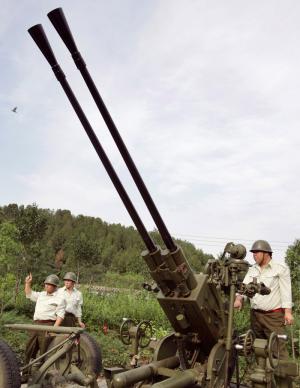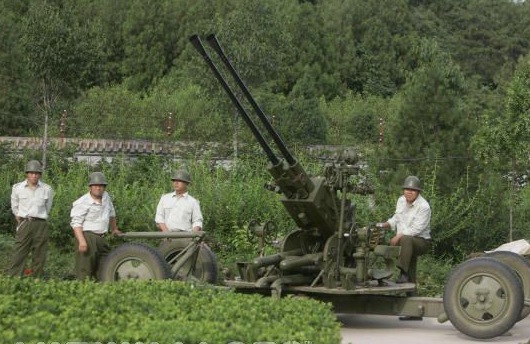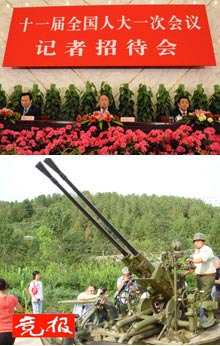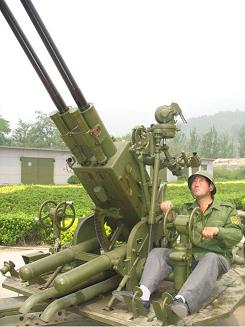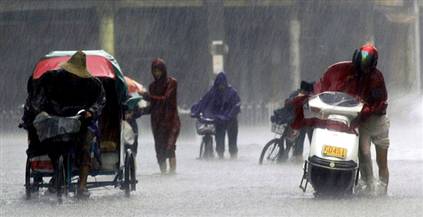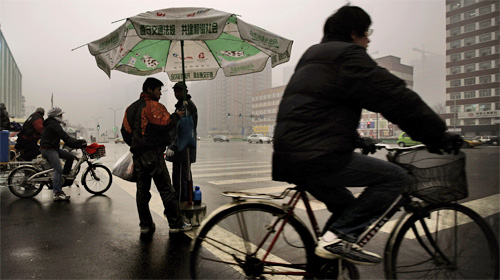|
|
||
"For the 2008 Olympics, the Chinese
have set aside 30 airplanes, 4,000 rocket launchers, and 7,000 anti-aircraft
guns to stop rain. The Chinese plan to shoot various chemicals into any
threatening clouds to shrink rain drops before they reach the stadium."
-Wikipedia
http://en.wikipedia.org/wiki/Beijing_Weather_Modification_Office
|
||
|
4,000 Rocket Launchers and 7,000 Anti-aircraft Guns ..
China’s meteorological bureau
guarantees good weather for Olympics
BEIJING, Feb. 1 - Beijing’s
Meteorological Bureau announced yesterday at a Beijing Olympics Organizing
Committee meeting that they are fully prepared to take control of the most
unpredictable element in sports – the weather. China is a world leader
along with the Russians in what is known as “weather modification science;”
however this has usually been deployed to create rain, rather than eliminate
it.
Cloud seeding for example has long been used by the Chinese since the 1950s to bring on downpours, particularly in the North, where desertification has eaten away at precious arable land resources, and trying to induce rain to fall in the drier provinces. There has been success – deserts are slowly waning in China and more land is being reclaimed. The Russians, too, have long been experts in this field – sophisticated rain seeding carried out over Chernobyl prevented much contaminated rain from reaching further than it did in the aftermath of the nuclear catastrophe. However, the reverse procedure – ensuring no rain falls – is little used. Summer is generally a rainy season for North Asia, even in hot Beijing, where on August 8, the date set for the opening ceremony, a 50 percent chance of it raining exists; according to the Beijing bureau’s own statistics. The weather modification technique, similar to that of cloud seeding, but requiring far more accuracy, is ready to go ahead to preserve a “clear weather window” over the 91,000-seat Olympic Stadium it was announced. Due to the precise science of this, a decision would need to be taken to deploy the technique “just one day prior to the event or very close to it” according to Wang Yubin, an engineer from the meteorological bureau. Training for this eventuality has been going on for the past two years, with trials being held during the China-Africa summit in Beijing last year, and also at a panda festival in Sichuan. China’s Bureau of Weather Modification was founded in the 1980s and is believed to be the largest in the world, with an army of some 37,000 reserve assistants who assist during rain seeding programs nationally, and an entire battalion’s worth of equipment, including aircraft, rocket launchers and anti-aircraft guns to propel cloud seeding chemicals, such as silver iodide, salt and dry ice into clouds. SOURCE: China Briefing |
||
According to the Chinese Meteorological Administration (CMA), local weather- modification offices all over this vast country now have 39,000 field operatives, equipped with 7,113 anti-aircraft cannons and 4,991 truck-mounted rocket launchers. 'In 2006 they fired a million rounds at the weather, and launched 80,000 rockets. For the most ambitious efforts, they had access to 35 specially equipped airplanes, which that same year flew 590 sorties, dispensing 26,158 pounds off dry ice, 1,487 pounds of silver iodide, and 2,300 gallons of liquid nitrogen. All together the operators claimed to have covered more than a third of China's landmass, excluding Taiwan.' - SOURCE |
||
|
..
November 14, 2007 Wired Science Not content to push the edge in cloning, architecture and geological engineering, China's also leaving the rest of the world behind when it comes to controlling the weather. A few years ago, Australian journalist John Taylor reported, It's uncanny living in Beijing how it rains on the eve of major events. Be it a big domestic event, or a visiting foreign politician, the rain has usually fallen the day before, making for temporary blue skies free of the normal haze. Chinese officials say cloud seeding has helped to relieve severe droughts and water shortages in cities. In Shanghai officials are considering the measure to cool the daytime temperature, easing demand for electricity. When next summer's Olympics roll around, the Beijing Weather Modification Office will be poised to intercept incoming clouds, draining them before they get to the festivities. No fewer than 32,000 people nationwide are employed by the Weather Modification Office -- "some of them farmers, who are paid $100 a month to handle anti-aircraft guns and rocket launchers" loaded with cloud-seeding compounds. Some estimate that up to 50 billion tons of artificial rain will be produced by 2010. But Taylor noted that this has resulted in competition between cities to seed clouds first, and bitter acrimony when when region receives water claimed by another. During my cloud seeding reportage, a few weather modification scientists praised China's initiative. My gut instinct was to focus on China's less-than-stellar human rights record and just say, "Well, it's easy to mess with the weather when there's no paperwork to fill out or reparations to pay if you flood a village or turn a county into desert." But that's reductionist. At some level, it's about vision and will -- and China's got it.
Said Bill Woodley, a weather modification researcher who spent several decades running cloud seeding experiments for NOAA, "There's much we don't know, as compared to China, where investment is 100 million a year. They're training young scientists and pilots; they've just gone crazy there. It's the epicenter of all weather modification activity. They're pushing hard. Whereas in the United States, the amount of money invested by any government is probably in the hundreds of thousands of dollars, if that. For a country our size, not much is being invested. Interestingly, when I opined that this was a shame, because with all the billions of federal dollars spent uselessly elsewhere, the government ought to shake a few million weather modification dollars out of the White House sofa, Woodley seemed a bit chagrined. You can't just throw money at it, he said -- there needs to be strong oversight, someone to make sure the research is first-rate, and so on. He mentioned a couple of weather modification research bills now creeping through Congress -- one introduced by Mark Udall (D-Colorado), the other pushed by Kay Bailey Hutchinson (R-Texas). If you think weather modification research is a good idea, go get your democratic participation on. SOURCE: Wired Science |
||
|
Ready, Aim, Fire and Rain Ready, aim, fire and rain
BEIJING - After weeks of watching the mercury soar, hardening the already cracked earth of their wilting orchards and farms, a group of farmers on the outskirts of Beijing gather in the Fragrant Hills that line the western fringe of China's capital city. Unlike their ancestors, they do not assemble to perform a rain dance or gather in a temple to pray to the Lord Buddha to bring the rain. Instead, they grab rocket launchers and a 37-millimeter anti-aircraft gun and begin shooting into the sky. What they launch are not bullets or missiles but chemical pellets. Their targets are not enemy aggressors but wisps of passing cloud that they aim to "seed" with silver-iodide particles around which moisture can then collect and become heavy enough to fall. The farmers are part of the biggest rain-making force in the world: China's Weather Modification Program. According to Wang Guanghe, director of the Weather Modification Department under the Chinese Academy of Meteorological Sciences, each of China's more than 30 provinces and province-level municipalities today boast a weather-modification base, employing more than 32,000 people, 7,100 anti-aircraft guns, 4,991 special rocket launchers and 30-odd aircraft across the country. "Ours is the largest artificial weather program in the world in terms of equipment, size and budget," Wang said, adding that the annual nationwide budget for weather modification is between US$60 million and $90 million. It is no coincidence that the world's biggest such project is in China. The country's leadership has never been cautious about harnessing nature, taking on a slew of what were once thought impossible engineering challenges, such as the Three Gorges dam, the world's biggest hydroelectric project, and the Qinghai-Tibet Railway, the world's longest highland railroad.
FRAGRANT HILLS, China — When
he’s not tending cherry orchards outside Beijing, Yu Yonggang can be found
behind the twin barrels of a 37mm anti-aircraft gun, blasting shells at
passing clouds. According to the Chinese government, the idea is for the
peasant gunners to work with meteorologists watching radar in the capital.
Together, they will hunt pregnant rain clouds and pound them with rockets
For a largely agrarian country like China, the weather was thought of as far too important to be left to the whim of gods or nature. As a result, Chinese scientists began researching man-made rain as far back as 1958, using chemicals such as silver iodide or dry ice to facilitate condensation in moisture-laden clouds. In the beginning, the idea was to ease drought and improve harvests for Chinese farmers, but over the decades other functions have evolved such as firefighting, prevention of hailstorms, and replenishment of river heads and reservoirs. Artificial rain has also been used by some provinces to combat drought and sandstorms. In 2004, Shanghai decided to induce rain simply to lower the temperature during a prolonged heat wave to bring relief to an increasingly hot and sweaty urban populace. And now China's weather officials have been charged with another important task: ensuring clear skies for the Summer Olympic Games next year. Zhang Qiang, the top weather-modification bureaucrat in Beijing, said her office has been conducting experiments in cloud-busting for the past two years in preparation for the Games' opening ceremony on August 8, 2008. She said that according to past meteorological data, there is a 50% chance of drizzle on that day. To ensure blue skies, the Beijing Weather Modification Office is busy researching the effects of various chemical activators on different sizes of cloud formations at different altitudes. The aim is to catch pregnant clouds early and induce rainfall ahead of the big day so that during the opening ceremony the sky is cloud-free. Wang said similar efforts in the past have already helped to create good weather for a number of international events held in China, including the 1999 World Horti-Expo in Yunnan and the 1993 East Asian Games in Shanghai. However, Zhang warned that her cloud-fighters will only be effective in the event of the threat of a drizzle: "A heavy downpour will be impossible to combat." Her caveat goes to the heart of the primary criticism leveled against weather-modification efforts worldwide: doubts about their effectiveness. Wang himself admits that it remains notoriously difficult to establish how much real impact cloud-seeding has, since there is no foolproof way to establish how much rain might have fallen without intervention. The United States, which pioneered cloud-seeding techniques in the 1940s and 1950s, has long cooled in its enthusiasm for the science behind artificial rain. However, Israel and Russia continue to have substantial weather-modification programs and Wang said experiments conducted in these countries reveal that cloud-seeding can increase rainfall by between 6% and 20%. Zhang said reservoirs in Beijing have shown an increase of 10-13%, one directly attributable to the efforts of her rainmakers. Despite some international skepticism, the Chinese authorities remain convinced of the merits of attempting to alter weather. China's state news agency Xinhua recently reported that between 1999 and 2006, 250 billion tonnes of rain was artificially created, enough to fill the Yellow River several times over. Moreover, China's 11th Five Year Plan, which kicked off last year, calls for the creation of about 50 billion cubic meters of artificial rain annually. While declining to provide specifics, Zhang said her office's budget has seen sharp spikes in recent years and she expects it to continue to grow given northern China's extreme water shortages, which are exacerbated by the impact of climate change. Indeed, the annual per capita water supply for China is only 2,200 cubic meters, just 25% of the global average, according to the World Bank. Artificial rain, however, is not controversy-free even within China. City dwellers have raised concerns about environmental pollution, though both Wang and Zhang insist that silver iodide is used in such tiny quantities that it brings no negative health consequences. Cloud-seeding shells and rockets have also sometimes gone astray, damaging homes and injuring inhabitants. Only last year a passer-by in the municipality of Chongqing was killed by part of a rain cannon that flew off during firing in May. Wang says training programs and licenses have sharply curbed accidents in recent years, and the 135 farmers who comprise the on-call rainmaking force in Beijing go through intensive training, lasting several weeks, before they are let loose on the artillery. The farmers are paid about US$100 a month for their cannon and rocket-launching duties, which they perform about 40 times a year. The person who gives the shooters the green signal to launch their cloud attacks is none other than Zhang, China's modern-day equivalent of Zeus, Indra, or the Chinese rain god Xuantian Shangdi. However, the businesslike bureaucrat is modest when it comes to describing her role: "We try our best, but there are no guarantees of success." Could the rain gods have claimed differently? Pallavi Aiyar is the China correspondent for The Hindu. (Copyright 2007 Pallavi Aiyar.) |
||
|
..
February 1st, 2008 With no roof on the showpiece Bird’s Nest stadium, the Beijing Meteorological Bureau has been charged with developing methods of preventing wet weather spoiling what promises to be a spectacular start to the Games on the evening of August 8. “Our experiments with rain mitigation have been aimed at light rain,” said Zhang Qian, Head of Weather Manipulation at the bureau. Making it Rain “With heavy rain it is more difficult. The results with light rain have been satisfactory.” Ms. Qian said different strategies were used to stop rain on different types of clouds, but both had proved not to harm the environment. “For cold clouds below zero degrees, we use a coolant made from liquid nitrogen to increase the number of droplets while decreasing their mean size,” she said. “As a result, the smaller droplets are less likely to fall and precipitation can be reduced. “For clouds above zero degrees we use the seeding agent silver iodide to accelerate the droplets’ collision and coalescence, producing a downdraft which suppresses the formation of clouds.” China has long used weather manipulation to increase rainfall in the parched north of the country, firing seeding agents into the clouds using anti-aircraft guns. This method might also be used to prevent wet weather at the stadium by inducing the rain to fall before it reached the target area, said Wang Yubin, deputy chief engineer at the bureau. “Rain mitigation is a very complex process, though,” he said. The weather bureau is also working hard on preparing for one of the pre-Games highlights, the ascent of the Olympic torch to the top of Mount Everest. Source: News.com.au: China ‘will stop the rain’ for Olympics SOURCE: Tiger Direct News
|
||
| Weather Engineering in China
How the Chinese plan to modify the weather in Beijing during the Olympics, using supercomputers and artillery. - Technologyreview.com |
||
|
..
GLOOMY: People ride bikes on
a damp day in Beijing last month. The real rainy season comes in summer,
and Chinese meteorologists have trained for the Summer Olympics by practicing
their “rain mitigation” techniques at recent special events. They’ve had
several successes.
'Weather modification' team will
manipulate the clouds in summer to try to keep the open-air stadium dry.
BEIJING -- It is yet another attempt by man to triumph over nature. Determined not to let anything spoil their party, organizers of the 2008 Summer Olympics said Wednesday that they will take control over the most unpredictable element of all -- the weather. While China's Olympic athletes are getting ready to compete on the fields, its meteorologists are working the skies, attempting the difficult feat of making sure it doesn't rain on the Aug. 8 opening ceremonies. "Our team is trained. Our preparations are complete," declared Wang Jianjie, a spokeswoman from the Beijing Meteorological Bureau, addressing a news conference at the headquarters of the Beijing organizing committee. The Chinese are among the world's leaders in what is called "weather modification," but they have more experience creating rain than preventing it. In fact, the techniques are virtually the same. Cloud-seeding is a relatively well-known practice that involves shooting various substances into clouds, such as silver iodide, salts and dry ice, that bring on the formation of larger raindrops, triggering a downpour. But Chinese scientists believe they have perfected a technique that reduces the size of the raindrops, delaying the rain until the clouds move on. The weather modification would be used only on a small area, opening what would be in effect a meteorological umbrella over the 91,000-seat Olympic stadium. The $400-million stadium, nicknamed the "bird's nest" for its interlacing steel beams, has no roof. "This is really a very complex process in terms of selecting the place and the time," said Wang Yubin, an engineer from the meteorological bureau. "Probably we will have to decide one day before or very close to the event." Jeff Ruffalo, a public relations advisor to the Beijing Olympics, believes this is a first for the Summer Olympics, which in recent years have taken place in drier cities -- Athens, Sydney, Barcelona. Summer is the rainy season in Northeast Asia. Originally, the Beijing Olympics were to open July 25, but meteorologists urged that the date be pushed back as late as possible. Still, the chances of rain in Beijing on Aug. 8 are close to 50%. Training with the Olympics in mind, the meteorologists have been practicing their "rain mitigation" techniques since 2006. They have had a couple of dry runs, so to speak -- a China-Africa summit and a panda festival in Sichuan province, among others. The Chinese have been tinkering with the weather since the late 1950s, trying to bring rains to the desert terrain of the northern provinces. The bureau of weather modification was established in the 1980s and is now believed to be the largest in the world. It has a reserve army of 37,000 people -- most of them sort of weekend warriors who are called to duty during unusual droughts. The bureau has 30 aircraft, 4,000 rocket launchers and 7,000 antiaircraft guns, said Wang Guohe, director of weather modification for the Chinese Academy of Meteorology. "We have the largest program in the world with the most people involved and the most equipment, but it is not really the most advanced," Wang said. That honor belongs to the Russians, who he says used sophisticated cloud-seeding in 1986 to prevent radioactive rain from the Chernobyl reactor accident from reaching Moscow. Although many scientists dispute the effectiveness of weather modification, Wang insists that it has been successful in China on a limited scale. "If you're talking about a small rainfall, you can eliminate it," Wang said. "But if it's going to be raining cats and dogs, there's nothing man can do about it." barbara.demick@latimes.com SOURCE: LA TIMES
|
||
|
Stroyproject Ltd ..
Specifications: Weather modification cloud seeding rocket disigned for active influence on hail and rain bearing clouds via spreading cloud-seeding agent based on silver iodide into atmosphere. Contact person: Mr. Orlin Nojarov
SOURCE: China
CN Papers: |
||
| FAIR USE NOTICE: This page contains copyrighted material the use of which has not been specifically authorized by the copyright owner. Pegasus Research Consortium distributes this material without profit to those who have expressed a prior interest in receiving the included information for research and educational purposes. We believe this constitutes a fair use of any such copyrighted material as provided for in 17 U.S.C § 107. If you wish to use copyrighted material from this site for purposes of your own that go beyond fair use, you must obtain permission from the copyright owner. | ||
|
|
